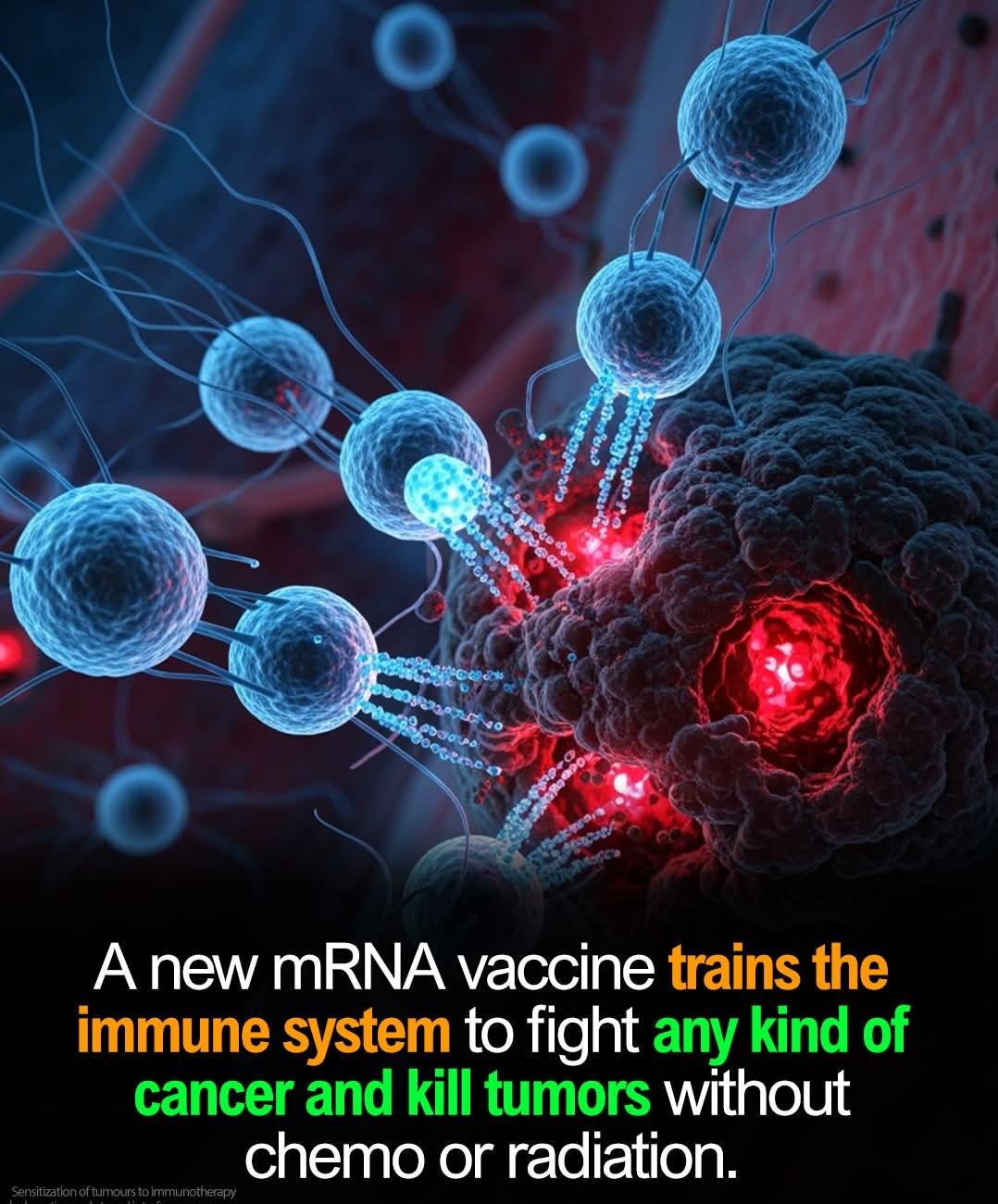Scientists at the University of Florida have developed a breakthrough mRNA vaccine that may be able to fight almost any type of cancer—without needing chemotherapy, surgery, or radiation. It works by reprogramming the immune system to identify and destroy tumors, even in cases where traditional treatments have failed.
Unlike typical cancer treatments that target a specific tumor, this vaccine takes a broader approach. It boosts early immune signals known as type-I interferons—like internal alarm bells—which help the body detect and attack cancer cells. These signals also trigger something called “epitope spreading,” meaning the immune system begins targeting multiple parts of a tumor instead of just one. That leads to a much stronger and more complete attack on cancer.
The mRNA used in the vaccine doesn’t directly target cancer cells. Instead, it delivers instructions that push cancer cells to produce a protein called PD-L1. This protein acts like a flag, making hidden tumors more visible to the immune system. Once exposed, the immune system can launch an attack—even against resistant cancers.
In mice, this vaccine successfully cleared stubborn tumors and protected against the cancer returning. Even more impressively, immune responses from one tumor could be transferred to help fight others. This opens the door to a universal, off-the-shelf cancer vaccine that could work across many types of cancer, offering new hope to people with difficult-to-treat cases.
Research Paper :
Qdaisat, S., Wummer, B., Stover, B.D. et al.
Sensitization of tumours to immunotherapy by boosting
early type-I interferon responses enables epitope
spreading.
Unlike typical cancer treatments that target a specific tumor, this vaccine takes a broader approach. It boosts early immune signals known as type-I interferons—like internal alarm bells—which help the body detect and attack cancer cells. These signals also trigger something called “epitope spreading,” meaning the immune system begins targeting multiple parts of a tumor instead of just one. That leads to a much stronger and more complete attack on cancer.
The mRNA used in the vaccine doesn’t directly target cancer cells. Instead, it delivers instructions that push cancer cells to produce a protein called PD-L1. This protein acts like a flag, making hidden tumors more visible to the immune system. Once exposed, the immune system can launch an attack—even against resistant cancers.
In mice, this vaccine successfully cleared stubborn tumors and protected against the cancer returning. Even more impressively, immune responses from one tumor could be transferred to help fight others. This opens the door to a universal, off-the-shelf cancer vaccine that could work across many types of cancer, offering new hope to people with difficult-to-treat cases.
Research Paper :
Qdaisat, S., Wummer, B., Stover, B.D. et al.
Sensitization of tumours to immunotherapy by boosting
early type-I interferon responses enables epitope
spreading.
Scientists at the University of Florida have developed a breakthrough mRNA vaccine that may be able to fight almost any type of cancer—without needing chemotherapy, surgery, or radiation. It works by reprogramming the immune system to identify and destroy tumors, even in cases where traditional treatments have failed.
Unlike typical cancer treatments that target a specific tumor, this vaccine takes a broader approach. It boosts early immune signals known as type-I interferons—like internal alarm bells—which help the body detect and attack cancer cells. These signals also trigger something called “epitope spreading,” meaning the immune system begins targeting multiple parts of a tumor instead of just one. That leads to a much stronger and more complete attack on cancer.
The mRNA used in the vaccine doesn’t directly target cancer cells. Instead, it delivers instructions that push cancer cells to produce a protein called PD-L1. This protein acts like a flag, making hidden tumors more visible to the immune system. Once exposed, the immune system can launch an attack—even against resistant cancers.
In mice, this vaccine successfully cleared stubborn tumors and protected against the cancer returning. Even more impressively, immune responses from one tumor could be transferred to help fight others. This opens the door to a universal, off-the-shelf cancer vaccine that could work across many types of cancer, offering new hope to people with difficult-to-treat cases.
Research Paper :
Qdaisat, S., Wummer, B., Stover, B.D. et al.
Sensitization of tumours to immunotherapy by boosting
early type-I interferon responses enables epitope
spreading.




